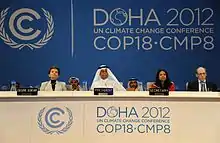
A conference of the parties of the Chemical Weapons Convention, in 2007
_to_the_Convention_on_Biological_Diversity_Hyderabad_India_DSCF5257_2.jpg.webp)
Flags at the 2012 Hyderabad Biodiversity Conference

A meeting of the 2012 United Nations Climate Change Conference
A conference of the parties (COP; French: Conférence des Parties, CP) is the supreme governing body of an international convention (treaty, written agreement between actors in international law). It is composed of representatives of the member states of the convention and accredited observers. Scope of the COP is to review the "implementation of the Convention and any other legal instruments that the COP adopts and take decisions necessary to promote the effective implementation of the Convention".[1]
Conventions with a COP include:
- Basel Convention
- Chemical Weapons Convention
- Convention on Biological Diversity
- Convention on the Conservation of Migratory Species of Wild Animals
- Convention on International Trade in Endangered Species of Wild Fauna and Flora
- Kyoto Protocol
- Minamata Convention on Mercury
- Ramsar Convention
- Rotterdam Convention
- Stockholm Convention on Persistent Organic Pollutants
- Treaty on the Non-Proliferation of Nuclear Weapons
- United Nations Convention to Combat Desertification
- United Nations Convention against Corruption
See also
References
- ↑ "United Nations Climate Change | Process and meetings ... Bodies ... Supreme bodies". unfccc.int. United Nations Framework Convention on Climate Change. Archived from the original on 24 February 2021. Retrieved 24 February 2021.
- ↑ "19th Session of the Conference of the Parties to the UNFCCC". International Institute for Sustainable Development. Archived from the original on 13 February 2013. Retrieved 20 February 2013.
Further reading
- Timothy L. Meyer (January 13, 2014). "From Contract to Legislation: The Logic of Modern International Lawmaking". ssrn.com. Social Science Research Network. SSRN 2378870. Retrieved July 15, 2022.
14 Chicago Journal of International Law 559
This article is issued from Wikipedia. The text is licensed under Creative Commons - Attribution - Sharealike. Additional terms may apply for the media files.